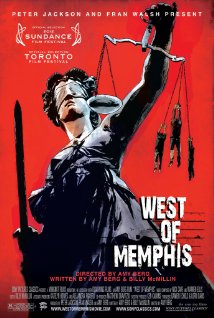
WEST OF MEMPHIS
US, 2012, 147 minutes, Colour.
Directed by Amy Berg.
West of Memphis is a fascinating documentary. It focuses on child murders that raised hackles in 1993, was the subject of a number of documentaries, the Paradise Lost series, and the subject of a fiction film, The Devils Knot, directed by Atom Egoyan.
Three young men, teenagers, were arrested for the murder of some children, brutality and sexual assault. The film traces in great detail the progress of the court case, the police investigations as well as negligence, the characters of the three men, forced confessions, local antagonism, prejudices and suspicions, which associated them with some Satanic worship.
There were a number of appeals and this documentary traces the development of those until the men were freed. Of interest is the development of the young men in over 15 years of imprisonment, some of them taking advantage of study opportunities to better their lives on release and the central character also involved in the production of this film.
There are also some suspicions of the parents’ behaviour at the time of the killings, especially one of the fathers whom the film virtually accuses of the murders.
One of the many documentaries over the years which are highly critical of the American justice system.
Amy Berg was the director of the Oscar-nominated documentary on clerical sexual abuse in the United States, particularly that of Father Oliver O’ Grady, Deliver Us from Evil (2006). New Zealand director, Peter Jackson and his wife, Fran Walsh, were involved in the financing and production.
1. Based on actual events? The three documentaries on HBO? The influence? This film bringing the themes together? The subsequent fiction film, The Devil’s Knot by Atom Egoyan?
2. Events in 1993 to 2011, the events themselves, the court cases, imprisonment, protest, the processes?
3. The involvement of Peter Jackson and Fran Walsh, the interest, correspondence, financing the investigation and the film? The talking heads and the quoting of letters?
4. Memphis, the city, the outskirts, homes and streets, the creek and waterways? Courts, prisons? The musical score?
5. The documentary footage over the years, edited into this film, the range of talking heads and interviews? The different perspectives, the families, the witnesses? The attitude of the judge? Prosecutors and parents?
6. The detailing of the crime itself, the visuals? The issue of timing, the boys and their age, on their bikes, friendship, the relationship with their families, mothers, stepfathers? The witnesses and not giving testimony until later? The later interviews? The three suspects, no real connection? The parents and their search for the children, the discovery of the next day, the gruesome find, the boys, tied, naked?
7. The arrests, the look of the boys, their ages, the charges? Alleged motivation? Damien and his interest in magic? Justin, young, Jesse and his being slow-witted, the testimony of his father? The confession used against him? And the later analysis of the pressures on, the interrogation, his slowness of wit? The duress?
8. The setting at the trial, seemingly impassive? The prosecutor and the accusations, the speculations? Issues of Satanism, the experts, the training programs and the videos, the guidance, beliefs?
9. The judge, his listening, weighing of the evidence, the guilty finding? The later question, his hearing the new evidence, not accepting it? His being elected to office?
10. The range of lawyers, the prosecution, the knife in the water, fabricating evidence? The Satanism? His later standing for election and failing?
11. The years in prison, Damien, the correspondence, fiance, over the years, the contact, love? Interviews with her? Her testimony? Education and betterment?
12. The development of protest groups, the lawyers investigating the case, the procedures, the bias? The talking heads? Developing information about the inconsistency in testimony? The knife in the lake…?
13. The families, the consequences, divorces?
14. Mark, his appearance, stepfather, under suspicion, his manner, the interviews, over the years, his anger?
15. Hobbs, his behaviour on the day, his evidence, the interviews? The later interview and his denying the truth about what he did? The passing of time? The
singers and his suing them? To court? The evidence about his cruelty to the boy, the buckle and beatings, his wife and testimony? His sullen manner, denying everything? His sister and her support of her brother? His implicating his friend and the friend’s upset and anger?
16. Over a decade later, the lawyers, preparing the case, the evidence, the role of the media, the media pack, the public, the approach of the judge, his refusing the evidence?
17. The lawyers, the proposal of the Alford plea, Justin and his refusing, his principles, not guilty? The other two men, prepared to agree? The prospect of freedom? Justin and his agreeing? The release, the interviews?
18. Getting out, Justin resuming his life, Jesse and his being reunited with his father? Damien, his wife, coming to New York, walking the streets free? The serving as producer for this film and for The Devil’s Knot?
19. Audience response to issues of American law, in the state of Arkansas, prejudice, appearances, behaviour in court, State pride? The effect of freedom after 17 years?